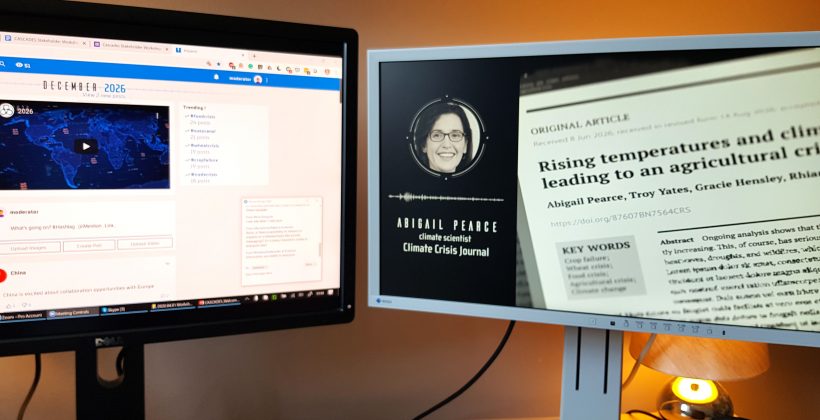
The COVID-19 pandemic showed us more than anything how our world is interconnected. Still in the process of adjusting to the new reality, the stakeholders and partners of the CASCADES project took part in a special online workshop. The event created the unique opportunity to experience how future climate impacts can disturb international trade, security, and finance.
The April event was the first of the three “core” stakeholder workshops in the project. Its goal was to introduce the stakeholders to cascading climate impacts, as understood by the CASCADES conceptual framework. In order to achieve this, the stakeholders took part in a specially designed policy simulation to experience how such a cascade of events can unfold. Then, they co-created plausible chains of events on their own during the thematic workshops.
The stakeholders and partners of the CASCADES project took part in a special online workshop to experience how future climate impacts can disturb international trade, security, and finance.
Policy simulations are designed and applied to collaboratively diagnose, analyze, and solve a specific real-life problem requiring strategic decision-making. They combine many elements of both formal science and humanities, including systems analysis and simulation techniques, storytelling, group scenario building, and role-playing. Most importantly, they give room for confronting people from different professional and personal backgrounds in a simulated setting that mirrors the dynamics of real-life challenges. The safe environment of simulation makes it possible for them to brainstorm and come up with and pre-test various solutions and strategies.
The Cascading Climate Impacts simulation took the participants to the year 2027. They assumed the roles of the representatives of various countries and organizations responsible for global safety and well-being. In these roles, they discussed and reacted to the current affairs on a special online platform for policy professionals. They were confronted with the scenario of dramatic events caused by climate crisis: global agriculture crisis leading to trade and supply chain disruptions, security issues, financial crash. The participants were invited to take part in a series of summits where they were asked to give their advice regarding the propositions for counter-acting the emerging crises.

The participants were keen to involve in the discussions and presented their roles’ points of view regarding the discussed propositions of action. In this fast-paced, interactive environment, many participants immersed in their roles quickly. The discussions were often heated and emotional. At the same time, the participants left their valuable feedback that will allow us to improve the content of the simulation, as well as the formal and technical aspects.
While the first part of the workshop was oriented towards experiencing a series of cascading impacts, the second part focused on putting the knowledge of the stakeholders to practice. The stakeholders split into three groups that corresponded with the thematic areas of the project: international trade, stability and conflict, and finance and business. Each group used online visual interactive tools to brainstorm and construct their own chain of events within the area of their expertise. The results are now being used by the project partners and will be discussed with the broader group of stakeholders during a follow-up workshop in June.
If the video below does not appear, please accept cookies, or view on YouTube
The COVID-19 pandemic changed the concept of this whole event. Initially planned as a two-day, face-to-face workshop, it was re-organized to a one-day, online setting. These changes impacted the original planning of both the simulation and thematic sessions. In the case of the simulation, it required, for example, redesigning some of the mechanics and abandoning additional features and special effects that were supposed to build the immersion during the face-to-face session. As for the thematic co-creation workshops, they were reduced from one-day to a 2.5-hour format in order to make them more accessible in the online setting, and online collaboration software replaced the traditional workshop methods.
The workshop will be followed up by the webinar during which we will discuss its results with the stakeholders. In the meantime, the simulation was already used outside the project for training purposes. The overall simulation process will be continued in the next workshops planned for 2021 and 2022. While the first session was focused on the presentation of the key project’s concepts, the next iterations will be oriented towards building and testing specific policies to prepare for the future risks and to strengthen the resilience of the European countries and organizations.
Visit socialsimulations.org to learn more about policy simulations



